 As a blogger, you are uniquely suited to become an author. If you have a successful site, meaning one with a large and engaged readership, you have set up yourself to produce bestselling books.
As a blogger, you are uniquely suited to become an author. If you have a successful site, meaning one with a large and engaged readership, you have set up yourself to produce bestselling books.
You can use your blog effectively to transform yourself from blogger to author. Either blog a book or book a blog. (I wrote about how to turn your blog into a book-production machine in this post.)
While the idea of writing a book intentionally post by post on your blog—blogging a book—or repurposing previously published posts into a book—booking a blog—might seem simple enough, many bloggers find the process overwhelming. After all, blogging a book is not much different from writing a book. And booking a blog takes a fair amount of thought and effort; you have to gather together posts that were written randomly on your site and make them work together as a cohesive whole (a manuscript).
Plus, most bloggers skip the most important step: preparation. You have to do the upfront work so the book you produce on or from your blog comes together into a product that will sell. Whether you produce a manuscript in posts published on your blog or pull material off your blog to accomplish the same task, you have to end up with a book that targets your market and provides something unique and necessary in a bookstore category. Simply said, you must produce a marketable book.
This post gives you the information you need to succeed at blogging a book or booking a blog. It provides you with the steps you must take to prepare your project so you can easily complete it and produce an end product your readers will want to buy.
The Number One Reason Blog-to-Book Projects Fail
Most bloggers want to book their blogs. They have a ton of content produced by many years of blogging, but they don’t think through their projects before starting. They decide a book resides in their blog and begin copying and pasting old posts into a new manuscript.
Those who want to blog books make a similar mistake. They get an idea for a book, decide to blog it, and start. They don’t do any planning; they just make a mad dash for the keyboard. Before they know it, the first post—or first 50—are published on the blog.
In both these scenarios, the bloggers failed to do any preparation prior to writing. They didn’t plan the best book possible, which sets them up for failure. The books they produce on or from their blogs are likely to be sub par. That means they won’t sell well.
That’s the first step: preparation. Initial planning helps you craft the best-possible book idea, a viable book structure, and a content plan. Once you know you have a marketable book idea, a sound book structure to go with it, and a content plan that provides the material to carry out that idea, it’s time to write. Not a moment before—and that goes for any book you write in any manner.
The Preparation
So, how do you plan your blog-to-book project? Although the steps for blogging a book are similar in some ways to booking a blog, let’s start with blogging a book.
- Choose a subject. The first part of your plan involves choosing a subject. You may be thinking, “That’s stupid. I will just blog a book about the topic of my blog or the topic I feel passionate about or interested in at this moment.” You need to choose a blogged-book topic that you can blog about for a long time. You continue blogging on the topic long after you finish blogging the book. Yes, you should be passionate about the topic and interested in it—but for an extended period. Plus, the topic must be one that is of interest to your potential readers. That brings us to the next planning step…
- Create a business plan for your book. This step is so important that I wrote a whole book about it. Every book needs a business plan, but this is especially true if you plan to self-publish. The traditional publishing industry has a business plan for each book, and it starts with the author’s book proposal. Used correctly the information in this business plan helps you do two things: evaluate your idea to determine if it is marketable and craft the best book possible—a book that will target your market, be unique and necessary in its category, and, therefore, sell.To create your business plan, use a nonfiction book proposal as your foundational document. It contains all the elements to help you evaluate your book idea for success.
- Create a pitch, list of benefit and a brief summary of your book. This helps you conceptualize your book idea and the value it will provide to readers in your target market.
- Write a reader profile and conduct a market analysis. This helps you understand what your readers need and want—and create content to provide them with these benefits. It also provides you with information on how to promote to them once your book is released.
- Conduct a competitive analysis. Studying the books (and blogs) that compete with the one you want to produce helps you understand what you need to make yours stand out from the pack. With the information from competitive analysis, you can craft a book that is unique and necessary in its bookstore category.
- Craft your book’s structure and content. Use the information in your business plan to brainstorm your book structure and content. Apply your creativity and craft to the information you gathered and create a table of contents. Then write chapter summaries.
- Hone your book idea. Take a big-picture view of what you created in your business plan—from the pitch down to the chapter summaries. Does everything line up? Will the content provide the benefits you outlined? Does the pitch and book summary describe the book you planned out? And does that final book structure and content target your ideal reader and market and fill a hole on the bookstore shelf?
Here’s an example of a mind map for a novel:
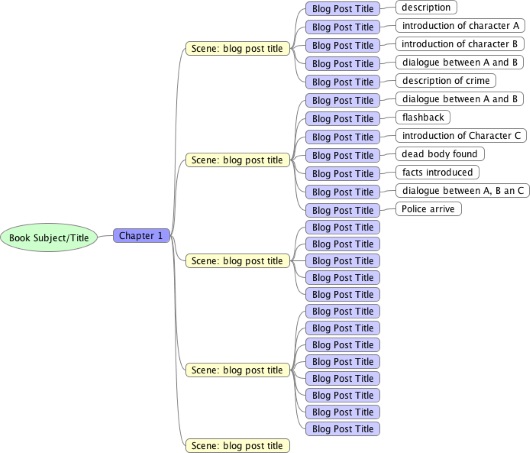
Here’s an example of a mind map for a nonfiction book:
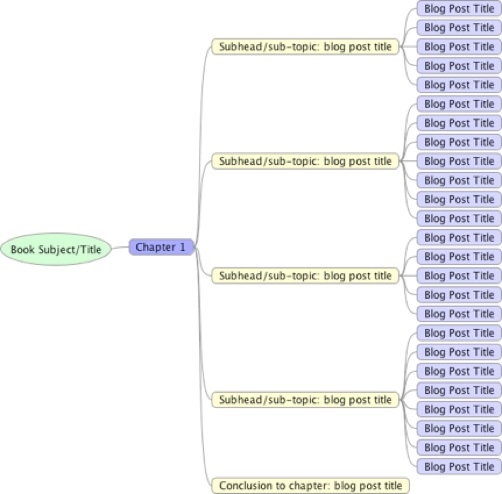
- Set up a blog.
- Promote your blog.
Now, let’s say you are booking your blog instead. I wrote a post on this site on how to mine your blog for publishable content, but here are the steps:
- Choose a topic related to your blog.
- Create a business plan for your book. In the process, craft the best-possible book idea—not the easiest book you can produce from existing posts. (This includes determining your book’s structure and content and deciding if your idea is marketable—or how to make it so.)
- Search your blog for existing posts that meet the requirements of your book plan.
- Fill in content gaps with new material you did not find on your blog.The process might look like this:

If you write nonfiction, your mind map or outline for the best possible book you can write might look like this:
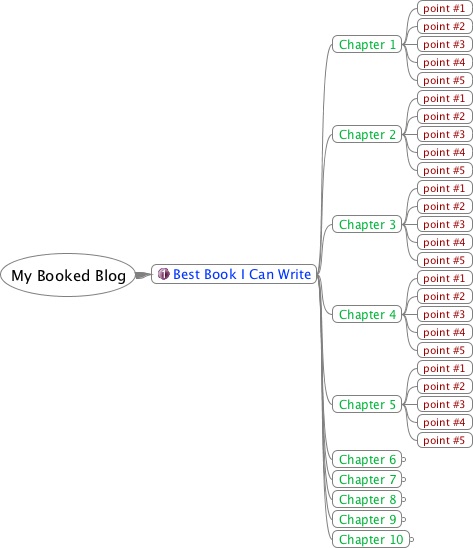
Once you begin looking for (and finding) appropriate posts, it might look like this:
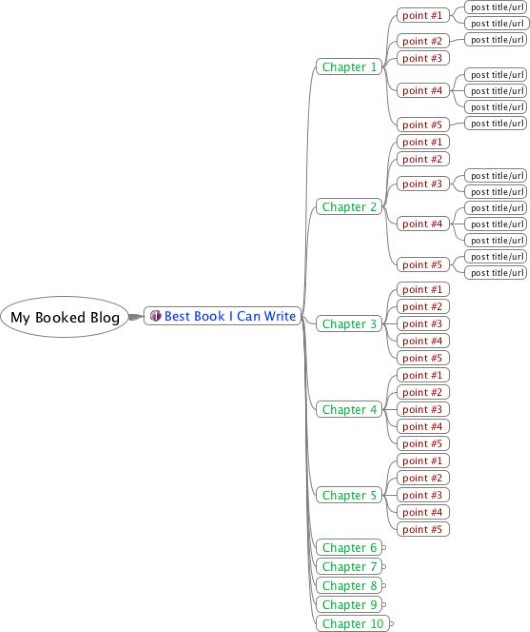
In the end, you’ll have something like this for each chapter…and you can finish up your book.
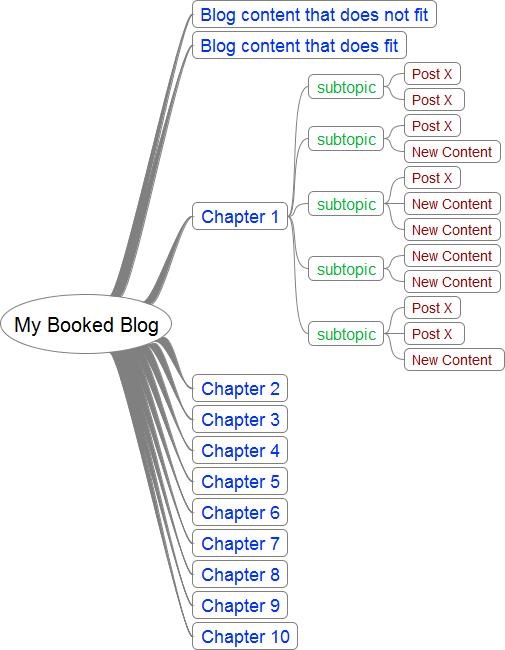
To learn more about blogging book and booking blogs, purchase a copy of How to Blog a Book Revised and Expanded Edition. And don’t forget purchase the Blog a Book Template Kit and How to Turn Your Blog Into a Book Production Machine to go with it!
Photo courtesy of StockSnap|Pixabay.com

Hi! First… I love you! And thank you for your ideas, suggestions and encouragement. I appreciate each one of your posts and read them carefully, trying to understand the words you choose to explain a concept and the spirit that fuels every line. I have your books, especially “How to Blog a Book” which I bought twice… The first one as soon as it came out and the second expanded edition, also as soon as it came out, for I did not want to miss one little thing that you wanted to convey to us, your readers. For a long time now I have been planning my own book, a very personal one, and it happens to be a cookbook and I am curious enough to ask you if there should be a structure for it… There are short stories accompanying the recipes but there will be no personal photos related to the family I am talking about and the way we cooked our food… My sin is that once I start writing, say, about New England Boiled Dinner, and I start with the beef brisket, I start and keep going and do more research and I remember more things and I want to explain so much more that the paragraph above the recipe turns then into an essay about brisket or a poetic ode to the meat… I would want to have more of an idea on where to stop and be stricter to keep it more concise, more comprehensible… If there is such a structure, please let me know where to find it… for a cookbook… Thanks!
Betty,
Thanks for your kind words…and for buying my books! You rock.
I am not a cookbook specialist, but I wrote on (that didn’t get published) that had an anecdote with each recipe. I think if you can find a common length for your commentary…say about 500 words per recipe…and have nice stories…that would work. But I’d seek out a cookbook expert and study other cookbooks for more information.
Thank you so much I had starting writing down my book idea down on the paper bit I could not now how to go about finishing
Am happy to find you Nina
I have leaner much and still need your support